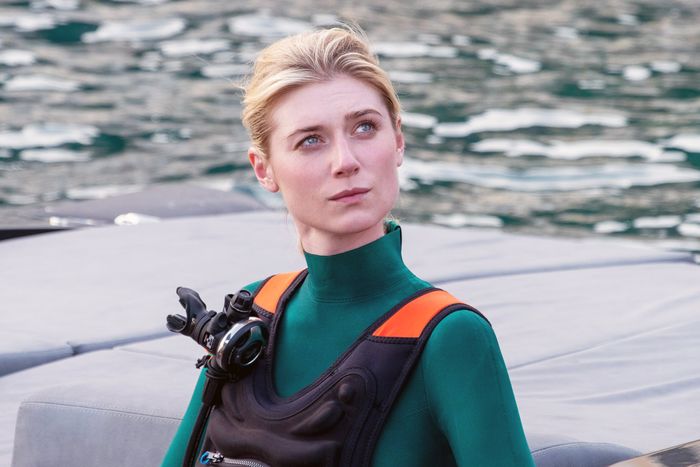
The confusing nature of Tenet is thankfully addressed within Tenet: when the Protagonist goes to visit scientist Barbara (Clemence Poesy’s character) to learn how to shoot a gun backwards (or whatever). “Don’t try to understand it,” she tells the Protagonist, “feel it.”
For all that people have tried to understand Tenet, many of them, even the film’s fans, both understand and feel that there is one particularly stupid line in the movie. It’s uttered during a pensive scene in which the Protagonist (John David Washington), Neil (Robert Pattinson), and Kat (Elizabeth Debicki) reckon with what could happen if the villainous Sator’s (Kenneth Branagh) time-bending plot comes to pass. “Everyone and everything that has ever lived … destroyed. Instantly. Precise enough?” Neil asks.
Kat frowns in classic Nolan-wife fashion (confused, concerned, with the weight of the world on her shoulders, even as we know nothing about her beyond her relationships to men) and asks the question heard around the world: “Including my son?”
The line was mocked on Twitter and Reddit. It was mocked by this very publication! It’s easy to make fun of for a number of reasons: Nolan has long suffered to make female characters interesting without fathers and sons and boyfriends to weigh them down; his work is frequently stagnant and silly when he goes for emotional resonance: Does she not understand that “everyone” and “everything” obviously includes her particular son?
Fans online have long supposed that Kat’s son — a child in the movie — grows up to be Robert Pattinson’s character, and there are a number of other convoluted theories justifying special attention to this blond child with no lines in the film. Perhaps I’m the most galaxy-brained of all the Tenet explainer types, because I don’t need a theory to justify the silliness of Debicki’s line. In fact, I think it’s one of Nolan’s most logic-forward bits of dialogue to date. It might actually be good — even moving.
Consider the scenes leading up to Kat’s “including my son?” and consider, briefly, that this is a character who was just shot in the stomach by her husband, Sator, the father of the aforementioned son. You can trust that if I had been shot in the stomach, I wouldn’t be articulate, logical, or even a normal level of smart. Perhaps she’s possessed with sudden knowledge that she might lose all that she holds dear (her son); perhaps her life is flashing before her eyes (her son). Perhaps she’s lost a lot of blood to an inverted bullet and is really confused (it’s around this time in the movie I start losing the plot). “Including my son?” is a centering and clarifying moment for a person whose priorities are jumbled and confused after incurring an injury in backwards-time.
Beyond that, the bluntness of that line captures what feels like Nolan’s ethos in his post-Batman movies: that the threatened destruction of the world matters, of course, but that it matters especially when it is happening to you. Think of the harrowing rally scene in Oppenheimer in which Cillian Murphy’s titular character has a vision of the bomb’s destruction across a crowd of American patriots, a woman’s face peeling off as she screams in horror. That’s not just any woman — that’s Nolan’s own daughter, Flora. Global conflicts become intensely personal catastrophes in Nolan’s movies, and his characters (and perhaps Nolan himself) can only truly fathom that terror when it is enacted upon the people they love. In Tenet, the director might as well be asking, “Including my daughter?”
Or — maybe it’s not that deep. Debicki plays Kat with a steely bitterness, though like every other character in Tenet, she appears out of nowhere with nary a one-sentence biography. She functions as a cynical audience stand-in, borderline uninterested in participating and completely confused by what’s going on. We might not know what she’s thinking. But again, at this very moment in the film, her blood is moving through her backwards after she was shot with an inverted bullet that is making her body either go from cold to hot or hot to cold. Of course she double-checks that “everyone” and “everything” includes her son. There are worse things than giving her the benefit of the doubt — like global annihilation, for one.
More on Tenet
- A Backward Movie for an Upside-Down World
- A Beat-by-Beat Explanation of What Happens in Tenet
- Why Christopher Nolan Fell in Love With Bulky, Expensive, Way-Too-Loud Film


